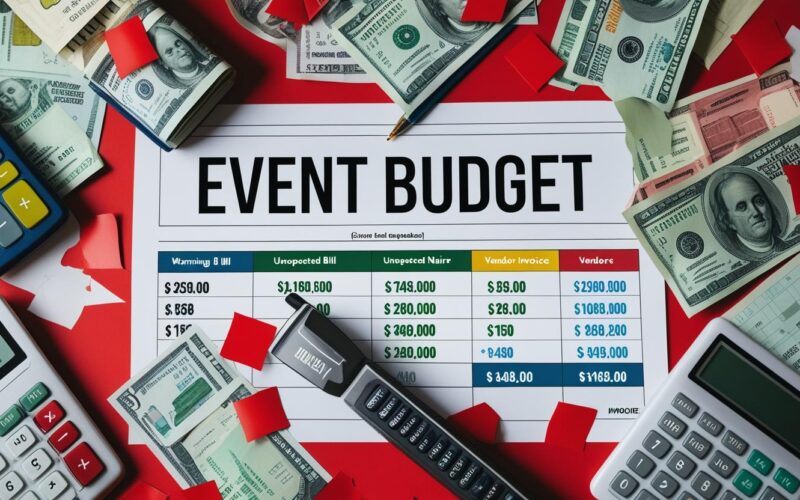You know that feeling when you’re convinced you’ve nailed everything and absolutely nothing, not even event budget mistakes can ruin it? I mean, you’ve just wrapped up an amazing event. The feedback is buzzing, the vibes were immaculate, and you’re riding high on that post-event glow. Every kobo accounted for, every vendor neatly quoted, every line item looking sharp… until the surprises start rolling in.
First, the venue casually drops, “Oh, by the way, security isn’t included.”
Then the caterer hits you with a “here’s the quote for the additional menu you requested.”
You log into your bank app, ready to balance all quarters… and then, boom! Your smile freezes. Seems your balance is playing tricks on you.
Sounds familiar? I know right. In the wild, wonderful world of African event organising, it’s not always the big, obvious expenses that trip you up. It’s those silent assassins, the hidden costs, that quietly creep in and turn your financial forecast into a full-blown financial disaster. These aren’t just innocent event budget mistakes; they’re the sneaky culprits behind many a sleepless night.
So, if you’re asking yourself, “What actually are the common mistakes in event budgeting?”, listen up. Most of them come from ignoring these hidden costs, those expenses you didn’t factor in but still have to pay, usually at the absolute worst possible moment. If you want to avoid these event mistakes and save your sanity, here are 10 hidden costs that can quietly blow up your budget and how to plan better. Stick around till the end for a bonus tip—the biggest hidden cost of them all (at least in my book).
1. Last-Minute Vendor Changes & Charges
You’ve agreed a price with your decorator, caterer, or sound engineer. But then, a week before the event, you decide to change a few things, and suddenly there’s a “rush fee” waiting for you. In Africa, where supply chains can be unpredictable, late orders almost always mean extra charges.
Take décor, for example. Your team gave you a quote, you thought you were sorted… then, two days before the event, you realise you need extra fairy lights, a different coloured fabric, or a last-minute floral arrangement because “it just doesn’t pop enough.” attracting express delivery fees, overnight labour rates, and a vendor who’s definitely charging you for the stress.
Plan your décor early and stick to your vision. Your budget (and your blood pressure) will thank you.
2. Generator & Power Backup Costs
In many parts of Africa, a reliable power supply isn’t exactly guaranteed. So you budget for a generator, right? But what about the fuel running all day (and night)? The engineer to operate it? The maintenance, or needing a backup generator just in case the first one decides to take a quick nap? This isn’t just an expense; it’s a saga that can drain your event budget faster than you can shout “Up NEPA!”
So, always budget for backup power, fuel, operator fees, transportation, and yes, a Plan B generator.
3. Permit & Licensing Fees
Depending on your event type and location, you might need a surprising number of permits or licences. Noise permits, security clearances, fire department inspections, entertainment licences, even local government permits for using public spaces. These aren’t always straightforward or cheap, and rushing them last minute can lead to fines, delays, or even your event being shut down. Check with local councils or regulatory bodies early in the planning stage. Start your permit hunt early.
4. Transportation & Logistics
You’ve budgeted for the big stuff, right? Venue, catering, A‑list talent. But what about actually getting everything (and everyone) where they need to be? Think about it: transporting extra chairs because the venue’s supply isn’t enough, shuttling artists from the airport, delivering décor props, water bottles, or just countless “quick trips” for your team. Each “small” trip, each extra litre of petrol, each minor vehicle hire, adds up. Have you seen the cost of petrol?
A classic event budget mistake is underestimating the constant movement required. Get a detailed transport plan upfront and include a contingency for unexpected trips.
5. Currency Fluctuations
This one can really hit your event budget unexpectedly, bestie. You agree on a price with an international vendor or a tech service, and it feels reasonable at the time. But by the time the invoice is due, the exchange rate might have shifted significantly, turning what looked like a good deal into a much heavier bill. That dollar or pound amount can quickly become far more expensive than you planned.
Don’t wait for surprises. If possible, pay international vendors early to secure the current rate. Crucially, always build a healthy buffer into your event budget specifically for currency changes. It’s your essential safety net against those unpredictable market shifts.
6. Unexpected Venue Charges
You signed the venue contract, paid the fee, feeling smug. But did you read the fine print? Because many venues have hidden charges for things you assume are included: using their in-house sound system, extra hours for setup or breakdown, specific security personnel requirements, cleaning fees beyond a basic sweep, or even charges for corkage if you bring your own drinks. Always ask for a detailed breakdown of all potential fees beyond the initial hire, and get it in writing.
7. Taxes & Hidden Service Fees
You get a quote from a vendor, let’s say, ₦500,000 and you think, “Sounds great” But then, you spot the suspicious “VAT not included” or “service charge” that suddenly up the cost by 7–10%. Trust me, these small percentages might look tiny on paper, but when you’re dealing with multiple vendors and a hefty overall event budget, they add up faster than you can blink. It’s a classic event budget mistake to overlook them.
Always, and I mean always, request an all-inclusive quote right from the start. Make sure it explicitly states that all taxes, service charges, and any other potential fees are factored in. And before you sign anything, read that fine print like your life (or at least your event budget) depends on it. No room for hidden surprises.
8. Overlooking Staff Welfare (Beyond Salaries)
You’ve budgeted for staff salaries, but have you factored in their full welfare? We’re talking about feeding them, providing transport allowances for late nights and perhaps even a small token of appreciation for their hard work (a little tip here & there). A well-fed and well-cared-for team is a productive team. Cutting corners here leads to unhappy staff, poor service, and ultimately, a less successful event.
9. Contingency Fund Deficiency
You’ve put a 5% contingency in your budget? Bless your heart. For African events, sometimes you need 10% or even 15%. Things happen: a vendor pulls out, equipment malfunctions, the weather changes unexpectedly, or there’s an unforeseen tax. Not having a robust contingency fund is one of the biggest event budget mistakes you can make. It’s your financial safety net when the inevitable ‘wahala’ shows up.
10. Audience Engagement Gimmicks
In the rush to make an event “memorable,” organisers sometimes add last-minute gimmicks for audience engagement that have little impact but cost a fortune. Think expensive photo booths nobody uses, oversized branded props that block views, or costly giveaways. Focus your budget on genuine value and interaction that aligns with your event’s core purpose, rather than impulsive, flashy additions.
Bonus Point. Because yes, there’s always one more thing!
11. Clean-Up & Waste Disposal
The party’s over, everyone’s gone home, and you’re exhausted. But who’s cleaning up the aftermath? You might have budgeted for basic cleaning, but what if there’s excessive waste,
spilled drinks everywhere, or damage to the venue? Specialised waste disposal, extra cleaning crew hours, or repair costs can quickly become a significant unbudgeted expense. Discuss cleaning expectations with your venue early. Confirm if post-event clean-up is included in the fee or plan to budget for it separately.
How to Prepare Budget for an Event and Avoid These Mistakes
- List every possible cost including small things like printing, fuel, snacks, and signage.
- Add a 10–20% contingency fund for unexpected expenses.
- Get itemised quotes instead of ballpark figures.
- Confirm everything in writing from power supply to cleaning responsibilities.
- Review your budget weekly leading up to the event to catch potential overruns early.
Final Thoughts
Most event mistakes aren’t because organisers are careless. They happen because people underestimate hidden costs. With proper planning and a clear understanding of what to expect, you can run successful events without breaking the bank.
Plan smart, be prepared, and let your event shine bright without the financial drama. Honestly, if you’re an event organizer in Africa, knowing how to optimize your budget should be in your top 10 event marketing tools. And hey, don’t forget—use the taron Events App to host, monetize, and share your events with the world!


